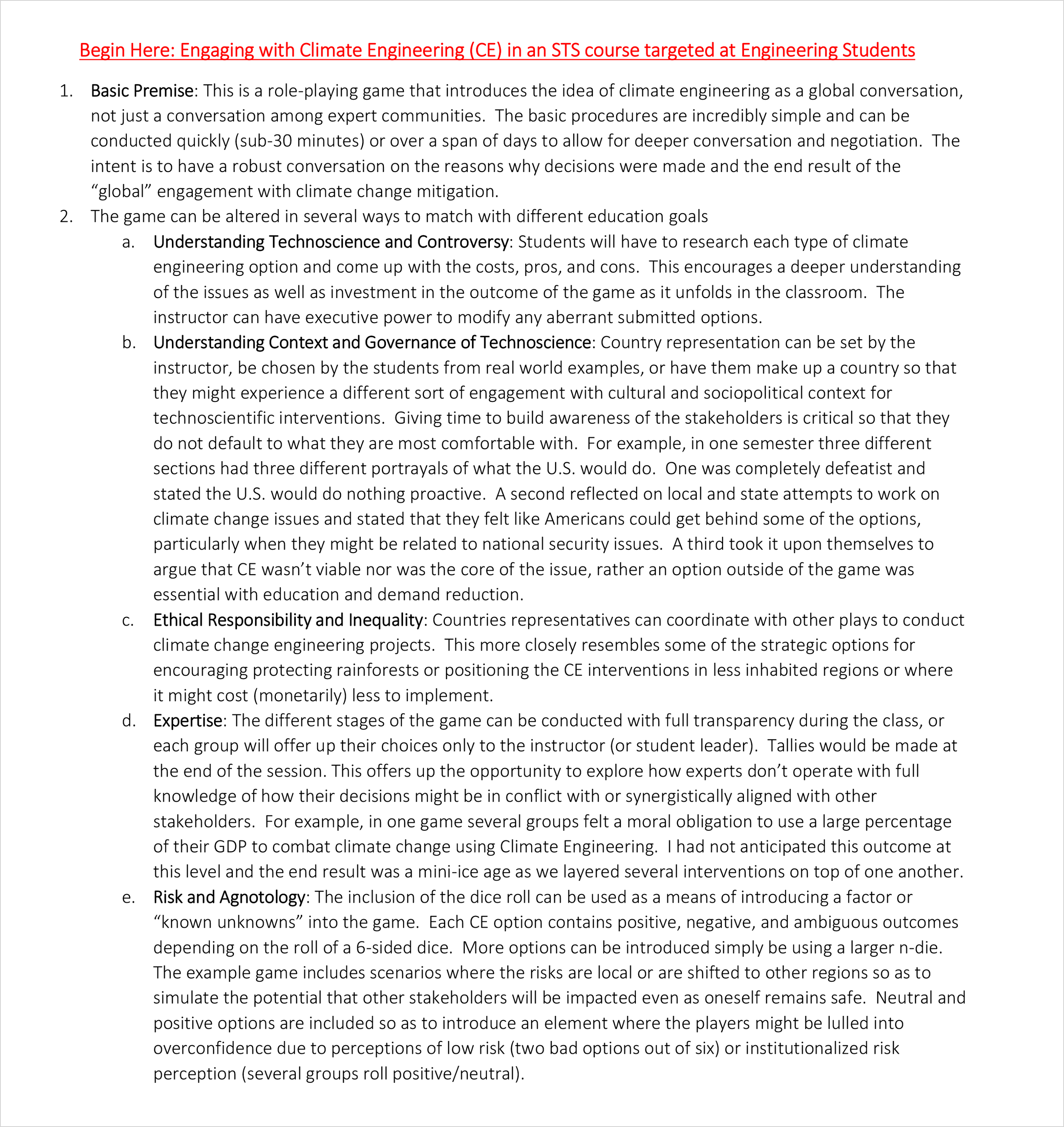Exemplar Type: LESSON/ GAME
Title: Geoengineering Game Experiment
Grades: 11-12, Undergrad
Discipline: Engineering
Submitted By: Sean Ferguson
Geoengineering Game Experiment
This is a role‐playing game that introduces the idea of climate engineering as a global conversation, not just a conversation among expert communities. The basic procedures are incredibly simple and can be conducted quickly (sub‐30 minutes) or over a span of days to allow for deeper conversation and negotiation. The intent is to have a robust conversation on the reasons why decisions were made and the end result of the“global” engagement with climate change mitigation.
The game mechanics of this game are fairly simple. The goal is to generate discussion of the ethics, responsibilities, and contextual challenges of attempts to “fix” climate change problems. Each group represents a country and you should position your thoughts and actions with a goal to understand how different members of that society might consider geoengineering at a local and global level. Each group will investigate the options I have presented, the socioeconomic options and hurdles, and determine what interventions you might take. There is no pre‐determined means of winning and the options presented are not all inclusive. The few restrictions one has on choices is the GDP for each member state. One can’t simply “solve” the problem by spending $trillions when one does not have $trillions available.
BENCHMARKS REPRESENTED IN THIS EXEMPLAR
Big Ideas
Everything must go somewhere because there is no such place as “away”. Matter and energy do not appear or disappear. They cannot be created or destroyed. In a healthy community, one species’ waste is another species’ food
All systems have limits. Healthy systems live within their limits. Tap the power of limits
We are all in this together: We are interdependent on each other and on the natural systems
A small shift in one thing can produce big changes in everything
Treating symptoms makes them worse over time, creates new problems and doesn’t address the fundamental problem. Create change at the source not the symptom
Quick fixes to complex problems tend to back fire
Sustain-ability requires individual and social learning and community practice
We all depend on and are responsible for “the commons”, i.e., what we share and hold in trust for future generations. Recognize and Protect the Commons
Higher Order Thinking Skills
Anticipatory: Futures Thinking
Emergent: Lateral Thinking
Complex: Critical Thinking
Applied Knowledge and Actions
Inventing The Future
Responsible Local and Global Citizenship
Sustainable Economics
Dispositions
Humble
Mindful
Open Minded
Risk accepting
Collaborative
Respectful
Responsible
Applications and Actions
Create Social Learning Communities
Engage in Dialogue
Engage in Role-Playing
Learning Journeys, Simulations & Games
Apply technology appropriately so that today’s solutions don’t become tomorrow’s problems
Design for whole systems integrity with ecological principles and physical laws in mind
Facilitate a shared understanding of sustainability and regeneration
Take responsibility for the difference you make
Practice justice and equity for all
Take responsibility for the effect you have on future generations






![The Fish Game Facilitator's Guide [excerpt]_Page_1.png](https://images.squarespace-cdn.com/content/v1/5db1e8ca57faeb4690f787ee/1581543518990-918S2CAF8UMELKDLDFUZ/The+Fish+Game+Facilitator%27s+Guide+%5Bexcerpt%5D_Page_1.png)
![The Fish Game Facilitator's Guide [excerpt]_Page_2.png](https://images.squarespace-cdn.com/content/v1/5db1e8ca57faeb4690f787ee/1581543518955-5SRC2EZ8N1OLS884EWYB/The+Fish+Game+Facilitator%27s+Guide+%5Bexcerpt%5D_Page_2.png)
![The Fish Game Facilitator's Guide [excerpt]_Page_3.png](https://images.squarespace-cdn.com/content/v1/5db1e8ca57faeb4690f787ee/1581543519457-2K5KMYY54CYUQYXWEV85/The+Fish+Game+Facilitator%27s+Guide+%5Bexcerpt%5D_Page_3.png)
![The Fish Game Facilitator's Guide [excerpt]_Page_4.png](https://images.squarespace-cdn.com/content/v1/5db1e8ca57faeb4690f787ee/1581543519549-VFB9Z1ZSPAGGHLIN03SN/The+Fish+Game+Facilitator%27s+Guide+%5Bexcerpt%5D_Page_4.png)